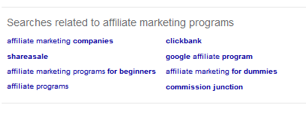Keywords are exciting, because they give you glimpses into the human brain. When someone wants information that can be found on your website, what exact words cross their mind? If you can figure that out, you not only find hot keyword phrases, you also get a bit of insight into what your ideal customer wants and needs.
Keyword tools are great resources, but don’t miss the opportunity to dig deeper into the psyche of your target demographic. Long-tail keywords are insightful in this manner, and they make it easy for you to generate creative topics for your site.
Use some of these little known but highly effective (and free!) methods to identifying profitable keywords.
Study Your Competitors
This is obvious, but not everyone knows how to do it. Start by determining who your competitors are by doing a Google search for your primary keywords and noting which sites appear on the first page. Go to those pages and peek at the page source code, noting the keywords appearing in the URL, page title and meta description tag. You may also find keywords used in the ALT text for images and videos on the page.
If there are no keywords listed, run the page URL into the Google AdWords Keyword planner to ask for suggested keywords as if you were running an AdWords campaign for that page. Google will tell you the perfect keywords that it thinks are most related to that page.
One tool that can make this process a bit easier is Xenu’s Link Sleuth (Windows only). It allows you to examine a website and obtain a long list of information related to the site. For instance, it provides meta data for the entire site. You can comb through this information to pull out potential search terms that you would like to use as well.
Make Connections With Dictionaries & Wikipedia
Start out with your primary keywords. Find entries on Wikipedia for those terms and identify other keywords used in the opening paragraphs of the entry. Note highlighted terms that lead out to related Wikipedia entries.
Keep following the trail from page to page, grabbing keywords from an endless trail of potential keywords. You may combine many of these words to create interesting long-tail keywords that lead to unique content.
Do the same with an online dictionary and thesaurus, noting related words and terms suggested for each of your best keywords. Metaglossary.com is a unique spin on a dictionary site that you may find useful for this purpose. You may also use sites like Tagboard to follow hashtags of relevance to your topic, leading you to hot or trending topics that relate to your niche.
Study the Search Engines
There are a couple features you can study when typing your primary keywords into Google:
As you type your search term, what search terms does Google suggest just below the search field? Google, and some other search engines, will automatically offer suggestions in an effort to give you what you want without forcing you to type it out.
Those suggestions are powerful hints leading you to search terms that are used by other searchers. Try typing your search term plus another letter of the alphabet to see what suggestions Google will automatically fill in for you.
Review the other search terms listed at the end of each results page. Scroll all the way to the bottom of your search results to find a list of related terms. Many of these terms are long-tail keywords that contain the word you searched for, but you may also find some terms closely related to your topic that may take your content in new directions.
eBay Product Suggestions
Similar to Google search, you can use the instant suggestions in eBay much the same way to find the most-searched keywords related to what you are entering.
Keyword Shop at Amazon
They sell everything else, why not keywords? This may be one of the best free products they will ever offer, and you should take advantage. When you Google your primary keywords, click on any Amazon product listings that appear.
Look at the categories listed below for clues to other keywords, following the trail much like you did for Wikipedia and the dictionary. Look at the titles and headers on each page to see what words are related to your primary keyword.
Do this not only with Amazon but with any large online retailer that relates to your niche. Look for sites that have a lot of products that relate to your niche and that allow visitors to leave reviews.
You can also use Amazon to scout out books related to your niche. Look for books released in the last year or two to identify hot topics within your niche. Book descriptions are often loaded with keywords that the author found relevant and useful. Plug them into your keyword tools to see how competitive they are and if they’re potential leads to long-tail keywords that may turn into shareable content for your site.
If you want to take this even further, identify trade magazines related to your niche. You can often browse the table of contents for some issues online, or you may browse entire magazines for free at your local library. When all else fails, find a bookstore and spend some time browsing in the store.
Pay attention to timely topics as well as advertisements within the magazine. Advertisers only pay for magazine ad space when they feel their products are of interest to readers of the magazine. If your target audience is the readership of the magazine, then you share an interest with those advertisers.
Search Social Media
Have you noticed that there are many Facebook pages with names like “inspiring weight loss quotes” or “fashion trends for girls.” These obviously aren’t business names, and they certainly aren’t personal names. They’re keywords used as names to attract people much the same as you use keywords to attract traffic to your website. Keywords are used on many other social media sites in much the same way, including Pinterest.
Go to the search field on Twitter, Facebook, Pinterest and other social media sites and type in your primary keywords. Go down the list of suggested pages or entries that contain your keywords, noting keywords used in names and titles.
This works particularly well if you search for your primary keywords on Twitter with a hashtag in front of the words. This will give you a list of tweets that contain that keyword as a hashtag. You will find many links to content, but you will also find thoughts and ideas from real people interested in your niche. Within their tweets you may just find golden keywords that your competitors haven’t discovered yet.
You may also see suggestions for groups and pages throughout social media sites as you use them for marketing or personal reasons. Always pay attention to the sidebars where paid suggestions linger because those suggested pages are recommended to you based on past search engine activity, and your past activity probably relates to your website in some manner much of the time.
Participate in Related Forums
Search terms give you powerful insight into what your target audience is thinking, right? There’s no better place to get into those heads than a forum where members of your target audience freely discuss topics related to your niche. They won’t realize they’re giving you keywords and content topics, but these sites are goldmines when it comes to understanding your market.
The best results come when you become an active member of the group and read a lot of posts. Once you find new topics that you haven’t thought about before, or someone mentions a related word that you haven’t used on your site, run the terms through your keyword tools and use some of the methods mentioned on this page to determine the value of those terms. And use them to come up with even more potential keywords.
This is a good way to get more than keywords. You can come up with ways to expand your website topics so that you provide the information your target market wants to find. For instance, if there is a hot debate on a forum, you could use that topic to provide information on your website. You can also create pages that answer questions commonly asked in forums.
Analyze Your Own Best
If you have an established website, pay attention to the keywords that you targeted in your top pages and posts. Those keywords have resonated with your visitors more than others, and there are probably more keywords where those came from. Use some of the keyword research strategies listed above to go more in-depth with these top keywords. List these keywords out and find ways to combine them into new long-tail keywords and unique content ideas that may become equally popular.
Open Your Eyes to New Possibilities!
Keywords become much easier to understand when you realize that they are all around you. Even billboards on the highway may give you some ideas if they relate in some manner to the subject of your website. Keep your eyes open and you will find many terms and words that you can turn into high-value keywords and must-have shareable content.
For more ideas on tools and methods you can use for keyword research, read “What Are The Best Keyword Research Tools For Your Business?”
Keyword research is an important foundation for building a website that gets found in the search engines. As an SBI! owner, you have access to SiteSell’s advanced keyword and niche research tool Brainstorm It!.
Start your research today with SBI!. Click below to learn more.


Latest posts by SiteSell (see all)
- You’ve Written an Ebook – Now What? - August 17, 2015
- The Only Five Ways to Monetize Your Audience (Plus One Armageddon Option) - August 7, 2015
- Why Publish on Kindle? - June 19, 2015







